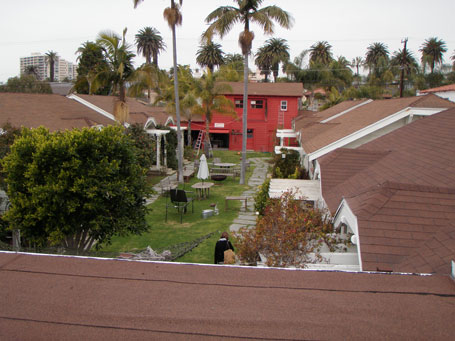GS: What was the most important thing you learned from your Harvard years?
SC: The pleasure was to be around some very ambitious folks. That is not something you are aware of at the time, but something you realize many years later. The admissions process of Harvard is a very good filtering process.
GS: What’s the most important thing you learned from your 2 years at National Enquirer?
SC: You can ask any question to anybody. No one is going to shoot you. So just do it.
GS: How did you like business school?
SC: Loved it. Having studied Greek and Latin… Accounting and finance was very exotic to me.
 Stephen Chao converted this 13-unit Santa Monica apartment building near Montana Ave into his home and a guest house for his mother after he purchased it in January of 2000. The photo was taken from the roof at the front of the house looking toward the red barn at the back. (Photo courtesy Stephen Chao)
Stephen Chao converted this 13-unit Santa Monica apartment building near Montana Ave into his home and a guest house for his mother after he purchased it in January of 2000. The photo was taken from the roof at the front of the house looking toward the red barn at the back. (Photo courtesy Stephen Chao)
GS: At what firm did you work as an investment banker? What were your duties?
SC: I worked with some private bankers who raised money for Hollywood. It was also the era of tax loopholes, which have since been closed. But it was too boring.
GS: What did you do between the time you left investment banking and the time you got the job with Rupert Murdoch and News Corp?
SC: I bummed around. Co-wrote a Fodors tour book of Turkey. I enjoy wasting time in exotic places and emptying my head. A healthy thing to do every 5 years.
GS: It seems you had a lot of clashes with Barry Diller that go beyond normal corporate egoes and differences of opinion. Was it more you or him? Fill us in on the dynamics behind that relationship.
SC: It was fun. A moment in time. The National Enquirer was about internal competition for the best editorial; I was sent to Brazil to chase a Farrah Fawcett story… and so was another team. Very darwinian.. Barry ran Fox much the same way. So having trained at the NE, fighting like crazy to get a front page story… Fox seemed like an extension of the same thing.
GS: Your days with Fox have left you with the image of a mercurial badboy who likes to discomfit and baffle people. Is that just your personality or was that some kind of conscious career strategy?
SC: I did not have time to look in the mirror and have a career strategy. I was too busy chasing ideas and making shows. I was going full tilt during my fox days with no bathroom break.
GS: Do you feel it was a bit harsh for Murdoch to fire you for hiring a stripper after the great shows you created at Fox?
SC: No. He is the only brilliant media strategist in the world. He did what he felt what he needed to do. We have remained cordial through all the firing and up to now.
GS: Assuming you didn’t need the money and had better ways to earn a living, how could you work at Mcdonald’s without worrying about the possible repurcussions to your image or that of your woman friend with whom you were living? Are you oblivious to your self-image and sense of respectability or do you consciously disregard such considerations?
SC: No disrespect. Dumb question. There is nothing bad about working at McDonalds. This is America. I can do what i want as long as i dont harm others. People will judge me by my mind, my ethics, and my work. I dont manicure an image. I am not that vain or insecure.
GS: Did any of your acquaintences see you at McDonald’s or ask you about it or offer to lend you money?
SC: Redondo. I ran into no one I knew.
GS: How could you not find flipping burgers for six weeks incredibly tedious?
SC: It’s really just something I felt like doing. I had been making TV shows nonstop for six years. I just wanted to do pure physical labor that had nothing to do with TV shows and news sets, and it was kind of fun for me. I really loved McDonald’s. Not so much any more…
GS: But didn’t it get really old after a couple of weeks?
SC: There was perhaps a moment as I was going into about week four when I said to myself, This is it? This is what I’m going to be doing for the rest of my life? It was kind of a terrifying moment. Next

